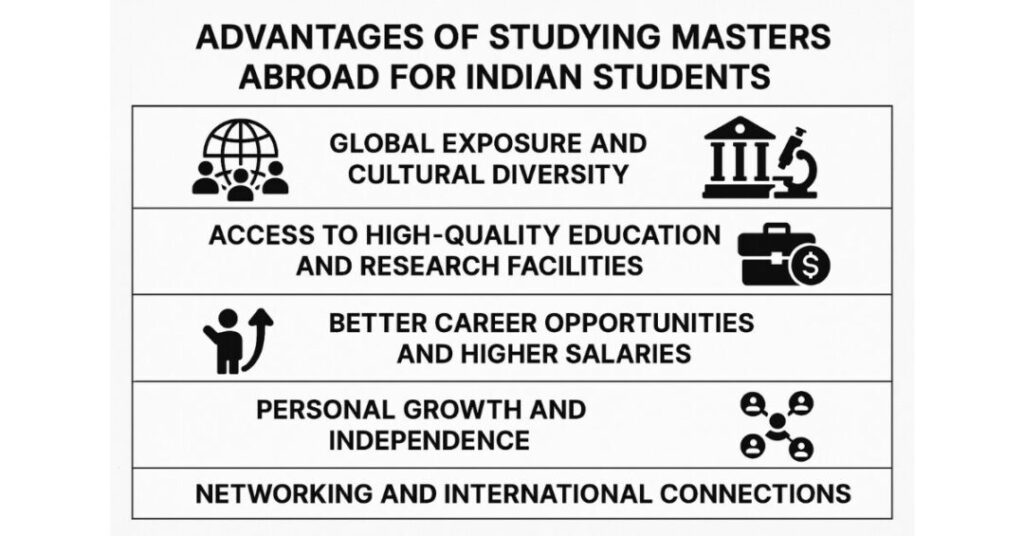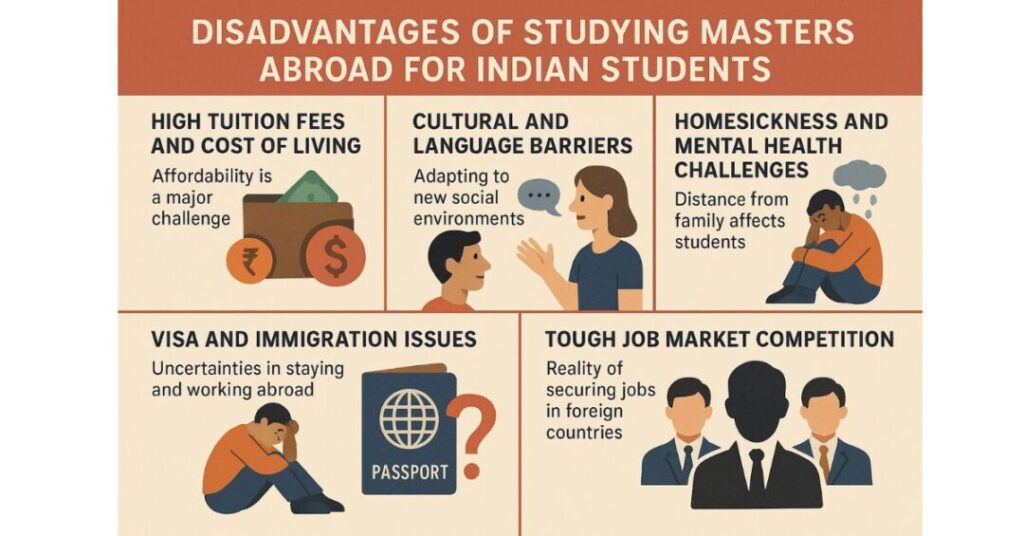11 September 2025
6 minutes read
What are the Advantages and Disadvantages of Studying Masters Abroad as an Indian Student?

Key Takeaways
- The advantages and disadvantages of studying masters abroad highlight both global opportunities and challenges Indian students must weigh carefully.
- International universities provide world-class education, cultural exposure, and career growth, but costs and competition remain real concerns.
- Exploring scholarships, part-time work, and networking can make studying abroad more rewarding and sustainable.
More than 7.5 lakh Indian students opt for studying abroad every year; nevertheless, many students are still doubtful if it is worth going abroad. The cost of international student tuition can be expensive, scholarships and financial aid can be limited, and students often feel lonely and isolated when they first transition to a new culture.
Yet while studying abroad does provide world-class education, job opportunities, and an international/global perspective, this article summarizes the advantages and disadvantages of studying masters abroad with the intent of maximizing your ability to consider the real pros and cons to determine if a master’s abroad is right for you.
Top 5 Advantages of Studying Masters Abroad for Indian Students
While the advantages and disadvantages of studying masters abroad are sometimes debated, the reality is that either way, studying for a master’s degree abroad provides unique opportunities that are even rarer where you are from.

Additionally, a master’s degree abroad offers Indian students life-changing experiences ranging from access to world-class research in highly-ranked international universities to simply experiencing a new culture. Here are the Top 5 Advantages of Studying Masters Abroad for Indian Students
1. Global Exposure and Cultural Diversity
One of the biggest benefits of studying abroad for indian students is the chance to immerse in diverse cultures and adapt to a completely new environment.
While studying abroad offers master’s students exposure to international universities, new language learning, and cross-cultural communication, it may also bring feelings of isolation away from home countries.
A degree from a foreign university provides access to global perspective and competitive edge, but international students must carefully weigh the pros and cons of studying abroad.
2. Access to High-Quality Education and Research Facilities
One of the strongest advantages of studying abroad is access to highly ranked international universities that provide cutting-edge research opportunities, advanced labs, and world-class faculty support.
A master’s degree abroad allows Indian students to immerse in new academic systems, adapt to diverse cultures, and gain a competitive edge in their careers. Here are the 10 Top Universities students should first consider while studying abroad
| Rank | University | Country | Key Strengths (Labs, Research & Faculty) | Why It Benefits Master’s Students |
|---|---|---|---|---|
| 1 | Massachusetts Institute of Technology (MIT) | USA | Cutting-edge research in AI, robotics, and biotechnology | Provides access to world-class labs and global perspective |
| 2 | Stanford University | USA | Advanced labs in engineering, medicine, and computer science | Study abroad opens doors to Silicon Valley opportunities |
| 3 | Harvard University | USA | Global faculty, medical and biotech research projects | Education abroad with competitive edge in diverse fields |
| 4 | University of Oxford | UK | Highly ranked labs, humanities, and sciences | Studying abroad offers exposure to new academic systems |
| 5 | University of Cambridge | UK | Innovative research centers, global collaboration | Allows international students to work part-time while studying |
| 6 | ETH Zurich | Switzerland | Advanced labs in physics, engineering, and chemistry | Countries like Switzerland provide scholarships and financial aid options |
| 7 | University of Toronto | Canada | Diverse cultures, global research networks | Degree from a foreign university enhances cross-cultural communication |
| 8 | University of Melbourne | Australia | Research facilities in biotech, environment, and health | Studying abroad will help students who study adapt to a new environment |
| 9 | National University of Singapore (NUS) | Singapore | World-class labs, Asian global hub | Many international universities in Asia offer competitive edge |
| 10 | Technical University of Munich (TUM) | Germany | Affordable tuition fees for international students, strong engineering research | Countries like Germany make studying abroad accessible |
3. Better Career Opportunities and Higher Salaries
One of the key pros of studying a master’s degree abroad is the career boost it provides. Universities abroad offer international education that equips students with language skills, global exposure, and the confidence to step out of their comfort zone.
While studying abroad comes with challenges like IELTS or TOEFL and the big decision of adapting to foreign countries, the study abroad experience often helps students who study abroad secure higher salaries and work abroad for personal and professional growth.
4. Personal Growth and Independence
Many students choose to study abroad not only for academics but also for personal growth. Living in a foreign country challenges students to step out of their comfort zones, manage responsibilities, and build resilience. While studying abroad may bring struggles, it often teaches independence and adaptability.
Since many countries allow international students to work part-time, this experience also strengthens confidence. Studying abroad is the right choice for those ready to weigh the pros and cons and embrace growth abroad can help achieve.
5. Networking and International Connections
One of the biggest benefits of a master’s abroad is the chance to build global networks. Abroad often brings together students from diverse cultures, academic systems, and professional fields, creating opportunities for lifelong connections.
International universities allow students to collaborate on research, internships, and projects with peers and faculty worldwide. Whether studying abroad for career growth or personal development, these connections provide access to international opportunities, mentorship, and collaborations that can shape future success across industries.
Top 5 Disadvantages of Studying Masters Abroad for Indian Students
While the idea of earning a master’s degree overseas sounds exciting, the reality is not always smooth.

The advantages and disadvantages of studying abroad can create real challenges that every Indian student must carefully consider before making the leap.
1. High Tuition Fees and Cost of Living
One of the biggest disadvantages of studying masters abroad is the high tuition fees and living expenses, which often discourage Indian students from pursuing their dreams. Rent, food, transport, and healthcare can quickly add up, making it a financial burden for many.
The good news is that several fully funded scholarships exist to reduce this pressure. These scholarships cover tuition, living costs, and sometimes even travel, ensuring students can focus on their academics rather than financial struggles.
| Scholarship Name | Offered By | Coverage | Eligibility |
|---|---|---|---|
| Chevening Scholarships | UK Government | Full tuition + living expenses | Indian graduates with leadership potential |
| Fulbright-Nehru Master’s Fellowships | USIEF (USA) | Tuition, living costs, travel allowance | Indian students with strong academics |
| Erasmus Mundus Joint Master’s | European Commission | Full tuition, travel, and living stipend | Students admitted to EM partner universities |
| DAAD Scholarships | German Academic Exchange Service | Tuition waiver + monthly living stipend | Indian students applying for German universities |
| Australia Awards Scholarship | Australian Government | Full tuition + airfare + living costs | Indian students with academic merit |
2. Cultural and Language Barriers
Another major disadvantage of studying abroad is adjusting to unfamiliar cultural norms and struggling with language barriers. Many Indian students find it difficult to communicate effectively, which can lead to misunderstandings, isolation, or a lack of confidence in academic and social settings.
The solution lies in the preparation; students can take language courses, join cultural exchange programs, and actively engage with peers. By embracing diversity and practicing patience, they can gradually overcome these barriers and turn them into valuable learning experiences.
3. Homesickness and Mental Health Challenges
One overlooked cons of studying abroad is the emotional struggle of being away from family and friends. Many students experience loneliness, stress, or anxiety while adjusting to a new environment, which can impact their mental health and academic performance.
The solution is to build a support system, join student groups, seek counseling services, and maintain regular communication with loved ones. By taking proactive steps, students can ease homesickness and develop resilience to thrive in their new journey.
4. Visa and Immigration Issues
A significant disadvantage of studying abroad lies in navigating complex visa and immigration processes. From delayed approvals to restrictions on work hours, these hurdles can disrupt academic plans and create uncertainty for students.
The solution is thorough preparation, researching requirements early, keeping documents updated, and seeking guidance from official embassies or university advisors. By staying informed and proactive, students can minimize risks, avoid last-minute surprises, and ensure their focus remains on education rather than legal complications.
5. Tough Job Market Competition
Another disadvantage of studying abroad is facing stiff competition in the global job market. International students often struggle to secure roles due to limited openings, employer preferences, or strict work permit rules. This can lead to uncertainty after graduation.
The solution is to gain practical experience during studies through internships, networking, and career workshops. By enhancing skills and building strong industry connections, students improve their employability and increase their chances of standing out in a crowded job market.
Conclusion
Choosing to pursue a master’s abroad is a life-changing decision, filled with both opportunities and challenges. While global exposure, advanced education, and better career prospects are undeniable advantages, high costs, cultural shifts, and job market competition are real hurdles. It’s essential to carefully discuss the pros and cons before making the leap.
That’s where Ambitio comes in, your trusted partner in study abroad success. With expert profile building, personalized guidance, and proven strategies, Ambitio helps you stand out and secure top admits. Ready to shape your future? Let’s build your dream journey together. Start with Ambitio Elite today!
FAQs
What are the academic benefits of studying masters abroad?
Studying masters abroad lets you access top-ranked universities and world-class faculty for superior academic growth.
How does studying abroad improve career prospects?
Graduates from global universities gain international exposure, advanced skills, and are highly valued by employers in India and abroad.
Can studying masters abroad help improve my language skills?
Pursuing masters abroad boosts your language and communication skills by immersing you in a diverse environment.
Does studying abroad help with personal development?
Studying abroad promotes independence, self-confidence, and the ability to adapt to new challenges and cultures.
Will I get a chance to experience different cultures while studying abroad?
Yes, you interact with people from various backgrounds and gain a global perspective on life and learning.
What is the main disadvantage of studying masters abroad?
The cost of tuition and living expenses can be significantly higher compared to studying in your home country.
Are there personal or emotional challenges when studying abroad?
Students may face homesickness, loneliness, and difficulties adapting to new cultures and academic systems.

You can study at top universities worldwide!
Get expert tips and tricks to get into top universities with a free expert session.
Book Your Free 30-Minute Session Now! Book a call now




























